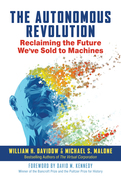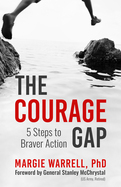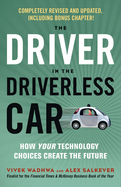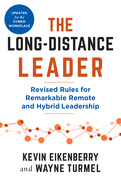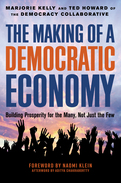Search Results: "building the future"
Results 25-30 of 1218
The coauthors of the seminal book The Virtual Corporation describe how the rise of artificial intelligence and virtual environments are ushering in an epic cultural transformation—and how we can thrive in this new era.
We are at the dawn of the Autonomous Revolution, a turning point in human history as decisive as the Agricultural and Industrial Revolutions. More and more, AI-based machines are replacing human beings, and online environments are gathering our data and using it to manipulate us. This loss of human autonomy amounts to nothing less than a societal phase change, a fundamental paradigm shift. The same institutions will remain—schools, banks, churches, and corporations—but they will radically change form, obey new rules, and use new tools.
William H. Davidow and Michael S. Malone go deeply into the enormous implications of these developments. They show why increases in productivity no longer translate into increases in the GDP and how zero cost, one-to-many communications have been turned into tools for cybercrime and propaganda. Many of the book's recommendations—such as using taxes to control irresponsible internet behavior and enabling people to put their data into what are essentially virtual personal information “safety deposit boxes”—are bold and visionary, but we must figure out how we will deal with these emerging challenges now, before the Autonomous Revolution overcomes us.
We are at the dawn of the Autonomous Revolution, a turning point in human history as decisive as the Agricultural and Industrial Revolutions. More and more, AI-based machines are replacing human beings, and online environments are gathering our data and using it to manipulate us. This loss of human autonomy amounts to nothing less than a societal phase change, a fundamental paradigm shift. The same institutions will remain—schools, banks, churches, and corporations—but they will radically change form, obey new rules, and use new tools.
William H. Davidow and Michael S. Malone go deeply into the enormous implications of these developments. They show why increases in productivity no longer translate into increases in the GDP and how zero cost, one-to-many communications have been turned into tools for cybercrime and propaganda. Many of the book's recommendations—such as using taxes to control irresponsible internet behavior and enabling people to put their data into what are essentially virtual personal information “safety deposit boxes”—are bold and visionary, but we must figure out how we will deal with these emerging challenges now, before the Autonomous Revolution overcomes us.
The Courage Gap
2025
The Courage Gap offers on-point leadership advice.—Kirkus Reviews
Do you sometimes hold back when you know you need to speak up or step forward?
Fear creates the gap. Courage closes it.
This powerful guide from the bestselling author of You've Got This! cuts through the hype to connect the 'why' of courage to the 'how' of courage. Drawing on cutting-edge research woven together with stories that compel head and heart, The Courage Gap will help you bridge the think/do gap between what you've been doing and what you can do; between where you are and where you want to be-in your career, relationships, leadership, and life.
Distilling theory and hard-won wisdom spanning from Margie's childhood in rural Australia to her decades of living around the world and coaching ‘insecure overachievers' in Fortune 500 organizations, Margie shares a powerful 5-step roadmap to reprogram the self-protective patterns of thought and behavior that sabotage success to bring your bravest self to your biggest challenges and boldest vision.
At a time when courage seems in short supply, in a culture continually stoking insecurity and anxiety, this book will transform your deepest fears into a catalyst for your highest growth and the greatest good.
Applying the five steps will:
• Ignite passion and unlock the potential fear holds dormant
• Rewrite the scripts that have kept you stuck, stressed, and living too safely
• Reset your ‘nervous' system and embody courage in critical moments
• Transform discomfort as a cue to step forward and expand your bandwidth for bold action
• Reset your relationship to failure and make peace with the part of you that wimps out
For leaders, The Courage Gap provides a guide to operationalize and scale the courage mindset across your team and organization to deepen trust, dismantle silos, foster innovation, accelerate learning, and unleash collective courage toward a more secure and rewarding future.
Tech experts Vivek Wadhwa and Alex Salkever describe dozens of astonishing technological advances in this fascinating and thought-provoking book, which asks what kind of future lies ahead—Star Trek or Mad Max?
Breakthroughs such as personalized genomics, drones, self-driving vehicles, and artificial intelligence could make our lives healthier, safer, and easier. On the other hand, the same technologies raise the specter of a frightening future—eugenics, a jobless economy, a complete loss of privacy, and ever-worsening economic inequality.
Wadhwa says that we need to ask three questions about every emerging technology: Does it have the potential to benefit everyone equally? What are the risks and the rewards? And does it promote autonomy or dependence? This edition is updated throughout and includes a new chapter on quantum computing, which promises vastly increased processing times—and vastly increased security risks. In the end, our future is up to us; our hands may not be on the wheel, but we will decide the driverless car's destination.
Breakthroughs such as personalized genomics, drones, self-driving vehicles, and artificial intelligence could make our lives healthier, safer, and easier. On the other hand, the same technologies raise the specter of a frightening future—eugenics, a jobless economy, a complete loss of privacy, and ever-worsening economic inequality.
Wadhwa says that we need to ask three questions about every emerging technology: Does it have the potential to benefit everyone equally? What are the risks and the rewards? And does it promote autonomy or dependence? This edition is updated throughout and includes a new chapter on quantum computing, which promises vastly increased processing times—and vastly increased security risks. In the end, our future is up to us; our hands may not be on the wheel, but we will decide the driverless car's destination.
Second edition of this bestselling book on creating robust, thriving, positive communities using seven ancient principles any organization can follow.
Now with 25% new content, including a chapter on building virtual communities.
Healthy communities strive for their members to support one another, share their passions, and achieve personal growth. This book will help you learn to be connected and defeat loneliness by understanding where and how we belong. No matter the kind of organization, company, or social group, this book is a guide for leaders seeking to build a community or strengthen the ones they already have.
Drawing on both 3,000 years of history and his personal experience, Charles Vogl lays out seven time-tested principles for developing connected communities that last. These include:
•Boundary: The boundary between members and outsiders
•Initiation: The activities that mark a new member
•Rituals: The things we do that have meaning
•Temple: A place set aside to find our community
•Stories: What we share that allows others and ourselves to know our values
•Symbols: The things that represent ideas that are important to us
•Inner Rings: A path to growth as we participate
With hands-on tools for applying these principles to any group-formal or informal, mission driven or social, physical or virtual-this book will guide you in your journey to become a community builder that brings people together
Now with 25% new content, including a chapter on building virtual communities.
Healthy communities strive for their members to support one another, share their passions, and achieve personal growth. This book will help you learn to be connected and defeat loneliness by understanding where and how we belong. No matter the kind of organization, company, or social group, this book is a guide for leaders seeking to build a community or strengthen the ones they already have.
Drawing on both 3,000 years of history and his personal experience, Charles Vogl lays out seven time-tested principles for developing connected communities that last. These include:
•Boundary: The boundary between members and outsiders
•Initiation: The activities that mark a new member
•Rituals: The things we do that have meaning
•Temple: A place set aside to find our community
•Stories: What we share that allows others and ourselves to know our values
•Symbols: The things that represent ideas that are important to us
•Inner Rings: A path to growth as we participate
With hands-on tools for applying these principles to any group-formal or informal, mission driven or social, physical or virtual-this book will guide you in your journey to become a community builder that brings people together
The new edition of this internationally acclaimed guide to remote and hybrid leadership comes with an updated and enriched framework for the modern workplace. It introduces new principles and retains proven strategies for effective leadership across distances.
When The Long-Distance Leader was first published, it was pre-pandemic and remote work was in its infancy with 30% of managers leading at a distance—now that number is well over 50%.
As more organizations adopt a remote workforce, the challenges of leading at a distance become more urgent than ever. The cofounders of the Remote Leadership Institute, Kevin Eikenberry and Wayne Turmel, show leaders how to guide their teams by recalling the foundational principles of leadership whether their teams are remote, hybrid, co-working, or something entirely new!
The authors' "Three-O" Model refocuses leaders to think about outcomes, others, and ourselves—elements of leadership that remain unchanged, whether employees are down the hall or halfway around the world. By pairing it with the Remote Leadership Model, which emphasizes using technology as a tool and not a distraction, leaders can navigate the terrain of managing teams wherever they are.
This second edition features updated exercises that ensure projects stay on track, keep productivity and morale high, and build lasting relationships, along with a new chapter on hybrid workplaces.
When The Long-Distance Leader was first published, it was pre-pandemic and remote work was in its infancy with 30% of managers leading at a distance—now that number is well over 50%.
As more organizations adopt a remote workforce, the challenges of leading at a distance become more urgent than ever. The cofounders of the Remote Leadership Institute, Kevin Eikenberry and Wayne Turmel, show leaders how to guide their teams by recalling the foundational principles of leadership whether their teams are remote, hybrid, co-working, or something entirely new!
The authors' "Three-O" Model refocuses leaders to think about outcomes, others, and ourselves—elements of leadership that remain unchanged, whether employees are down the hall or halfway around the world. By pairing it with the Remote Leadership Model, which emphasizes using technology as a tool and not a distraction, leaders can navigate the terrain of managing teams wherever they are.
This second edition features updated exercises that ensure projects stay on track, keep productivity and morale high, and build lasting relationships, along with a new chapter on hybrid workplaces.
Our economy is designed by the 1 percent, for the 1 percent. This book offers a compelling vision of an equitable, ecologically sustainable alternative that meets the essential needs of all people.
We live in a world where twenty-six billionaires own as much wealth as half the planet's population. The extractive economy we live with now enables the financial elite to squeeze out maximum gain for themselves, heedless of damage to people or planet. But Marjorie Kelly and Ted Howard show that there is a new economy emerging focused on helping everyone thrive while respecting planetary boundaries.
At a time when competing political visions are at stake the world over, this book urges a move beyond tinkering at the margins to address the systemic crisis of our economy. Kelly and Howard outline seven principles of what they call a Democratic Economy: community, inclusion, place (keeping wealth local), good work (putting labor before capital), democratized ownership, ethical finance, and sustainability. Each principle is paired with a place putting it into practice: Pine Ridge, Preston, Portland, Cleveland, and more.
This book tells stories not just of activists and grassroots leaders but of the unexpected accomplices of the Democratic Economy. Seeds of a future beyond corporate capitalism and state socialism are being planted in hospital procurement departments, pension fund offices, and even company boardrooms.
The road to a system grounded in community, democracy, and justice remains uncertain. Kelly and Howard help us understand we make this road as we walk it by taking a first step together beyond isolation and despair.
We live in a world where twenty-six billionaires own as much wealth as half the planet's population. The extractive economy we live with now enables the financial elite to squeeze out maximum gain for themselves, heedless of damage to people or planet. But Marjorie Kelly and Ted Howard show that there is a new economy emerging focused on helping everyone thrive while respecting planetary boundaries.
At a time when competing political visions are at stake the world over, this book urges a move beyond tinkering at the margins to address the systemic crisis of our economy. Kelly and Howard outline seven principles of what they call a Democratic Economy: community, inclusion, place (keeping wealth local), good work (putting labor before capital), democratized ownership, ethical finance, and sustainability. Each principle is paired with a place putting it into practice: Pine Ridge, Preston, Portland, Cleveland, and more.
This book tells stories not just of activists and grassroots leaders but of the unexpected accomplices of the Democratic Economy. Seeds of a future beyond corporate capitalism and state socialism are being planted in hospital procurement departments, pension fund offices, and even company boardrooms.
The road to a system grounded in community, democracy, and justice remains uncertain. Kelly and Howard help us understand we make this road as we walk it by taking a first step together beyond isolation and despair.


